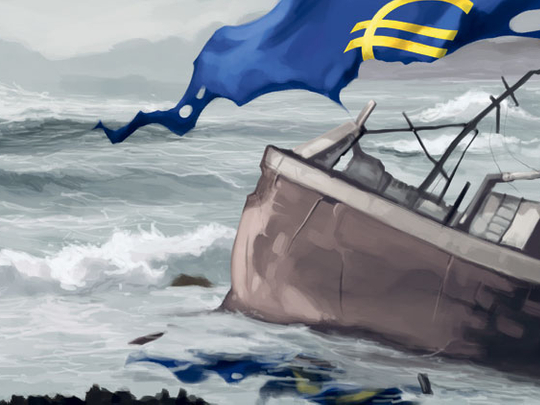
Rather than work hard, live within his means and save for the future, a dissolute student decided to invent a system for beating the bank at roulette. After months of experimentation with betting patterns, his quest bore fruit: a foolproof way of creating riches — or so he thought.
The problem was, in order to exploit his genius a bankroll was required. At this point, a credulous father was inveigled into the scheme. Suspending disbelief, the hapless parent signed a six-figure cheque and wished his son good fortune as the boy left for Las Vegas.
After a few days with no contact, Dad started to fret and sent the lad a tentative message: "How are we doing?" No reply.
A week later, he tried again, only this time was rather more panicky: "What's happening?" Still no reply. Finally, the desperate man sent an ultimatum: "Get in touch — or else!" His delusional offspring eventually replied: "Delighted to inform you system is working. Please send more money." This, now, is the position of the Club Med countries within the Eurozone. The single currency is functioning so brilliantly, its vulnerable members are sliding towards bankruptcy. Frittering away their credibility in remorseless bond markets, they turn to Das Scheckbuch in Berlin for hard cash.
On current form, Greece will be paying nearly 10 per cent of its GDP in interest by 2015. Portugal's 10-year borrowing costs are close to an unsustainable 7 per cent and would be even higher were it not for market manipulation by the European Central Bank.
No luck required
And Spain is sitting on 700,000 unsold homes, 20 per cent unemployment and a 33 per cent deterioration in competitiveness against Germany since the euro was formed. Yes, the system is working brilliantly. No luck required, just more money. But from where will it come? The bail-out fund of ¤750 billion (Dh3.81 trillion), cobbled together by the European Union and IMF, will not be enough. It may buy time, allowing Athens, Lisbon and Madrid to play the wheel for longer than they should, but their financial attrition grinds on.
Of the six Eurozone countries that still have triple-A credit ratings — Austria, Finland, France, Germany, Luxembourg and the Netherlands — only one really matters: Germany. As the EU's economic powerhouse (GDP growth was 3.6 per cent in 2010), it has become the lender of last resort. So far, Berlin has paid up, but 62 per cent of Germans now oppose further rescue packages for EU losers.
Faced with choosing between Europe's olive belt and her own electorate, Chancellor Angela Merkel will turn off the aid tap. So what can be done? Some are calling for the issuance of an all-embracing euro bond, enabling the weaklings to access credit on terms similar to those enjoyed by more muscular neighbours.
Recently, I asked Finland's prime minister, Mari Kiviniemi, if this was a good idea. She responded in the way that an exasperated teacher might scold a classroom dunce: "No, it is a very bad idea."
What about the ECB? Can it be relied upon to loosen monetary policy and allow rising inflation to ease the pain of the over-borrowed and inefficient? Not while Jean-Claude Trichet is in charge. The central bank piper is unmistakeably French, but the tune he plays is that of a Bavarian Oompah band. Forget a cut in the ECB's interest rate; it's more likely to go up. In short, there is no get-out-of-jail card. As the Bank of England's governor explained last week, Eurozone countries that binged on cheap money and self-indulgent pay awards must face up to improving competitiveness: "But because they are part of a monetary union and so do not have their own currency, they can do so only through outright falls in nominal wages."
Sprawling public sector
What, I suspect, Mervyn King believes, but dare not say, is that the excruciating realignment of income to output in the Club Med area has much further to run. Greece has barely scratched the surface of a sprawling and corrupt public sector, where standards of book-keeping shame a country that lays claim to the oldest counting board yet discovered (300BC). Greece is learning the hard way that cutting the budget deficit and reducing overall debt are not the same thing.
There comes a point where austerity alone cannot deliver a solution, because the burden of unaffordable debt is rising faster than savings can be made.
Long after the bullet has been bitten, total mortgage arrears continue to deteriorate. As long as Greece remains locked in a currency that is a deutsche mark with only a hint of garlic, its economy cannot recover. A lethal combination of rising unemployment, falling wages and an exodus of talent will force it to confront reality. That will occur when either the voters decide they can no longer stand the hair shirt or the country's creditors run of out patience. The same will apply to Portugal and, eventually, Spain. Thus the euro, as we know it, is finished. Which is why I'm a buyer of the euro. When the crunch comes — and the laggards secede or are expelled — the residue will be a group of solvent nations, unhindered by chronic budget and trade imbalances. As veteran investor Jim Rogers explains: "The more I look at it, the more I see Germany taking control of the euro." That'll do nicely.












